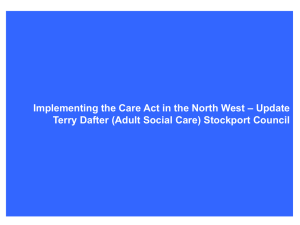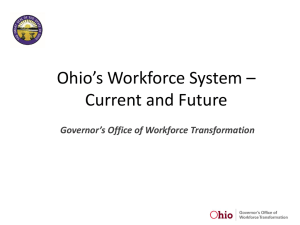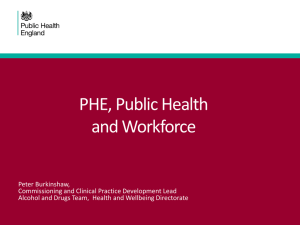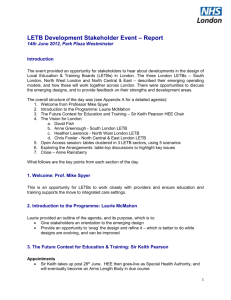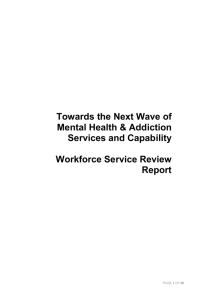WYPC PH Workforce – presentation
advertisement
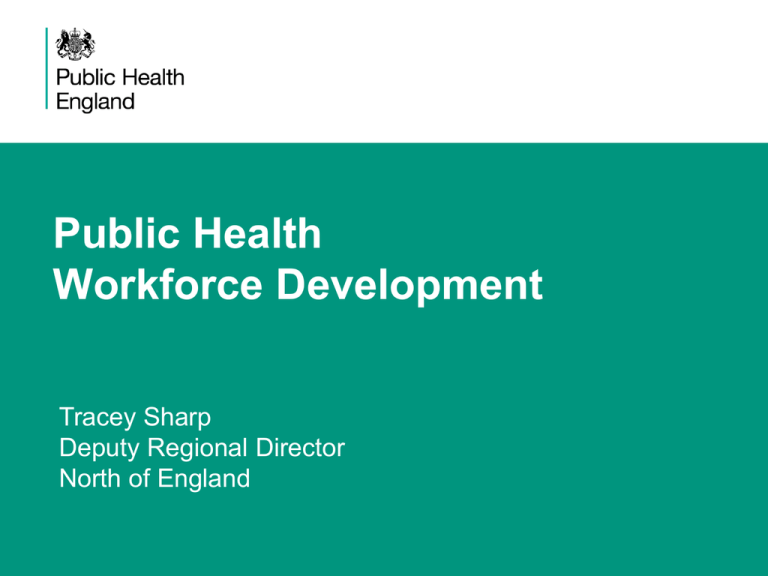
Public Health Workforce Development Tracey Sharp Deputy Regional Director North of England What does PHE do? Public Health England: – works transparently, proactively providing government, local government, the NHS, MPs, industry, public health professionals and the public with evidence-based professional, scientific and delivery expertise and advice – ensures there are effective arrangements in place nationally and locally for preparing, planning and responding to health protection concerns and emergencies, including the future impact of climate change – supports local authorities, and through them clinical commissioning groups, by providing evidence and knowledge on local health needs, alongside practical and professional advice on what to do to improve health, and by taking action nationally where it makes sense to do so Our priorities for 2013/14 – Reducing preventable deaths – Reducing the burden of disease – Protecting the country’s health – Giving children and young people the best possible start – Improving health in the workplace National Executive 8 Knowledge and Intelligence Hubs • • • • • • • • London South West South East West Midlands East Midlands North West Yorkshire and Humber East Other local presence • • • Ten microbiology laboratories Field epidemiology teams Centre for Radiation Control units Local focus 15 CENTRES – Led by a senior public health professional – Deliver services and advice around the three domains of public health – – Support local government and local NHS action to improve and protect health and reduce inequalities with intelligence and evidence Deliver the local input to emergency preparedness, resilience and response 4 REGIONS – Ensure quality and consistency and responsiveness of centres’ services and advice – Support transparency and accountability of the system – Assurance of emergency planning and response – Workforce development – Contribute to the national public health agenda Centre Roles The front door of PHE Assure services and expertise provided are truly focused on local needs Provide leadership and support across all three domains of public health – health protection, health improvement and healthcare public health. This includes: •supporting local government in their leadership of the local public health system; •supporting DsPH to access specialised advice and support; •working with the NHS Commissioning Board to support it in its role as a direct commissioner of key services, including specialist services and national public health programmes; 7 7 •and providing leadership in responding to emergencies where scale is necessary. Regional Roles Are co-terminus with those of the NHS England and other national partners, also mapping onto the nine regional local government groupings. Will nurture, assure, support and assist the local public health system and maintain an overview of the whole system’s progress in implementing the Public Health Outcomes Framework. Have responsibility for workforce development and oversight of implementation of the public health workforce strategy. 8 8 Workforce Team • Deputy Director for Workforce • Workforce Development Managers x 2 Working with and supporting Centre teams, Local Government, LETBs and Heads of Schools 9 9 Developing a work programme • Developing joint plans with LETBs /Heads of Schools • Supporting and advising LAs with DPH appointments and maintaining specialist capacity • Appraisal training and revalidation of the specialist workforce • Identifying and supporting CPD and L&D programmes • Supporting LETBs and Heads of School with specialist training and practitioner development programmes • Gathering data and workforce intelligence to aid workforce planning including leadership development, succession planning and talent management. • Supporting implementation of the PH workforce strategy 10 10 Immediate issues • Recruiting to the team • Assessing and maintaining current capacity (including DPH appointments) • Appraisal training • Gathering information and intelligence on the workforce (educational supervisors, trainee placements, practitioners) • Gathering information and intelligence on the assets (networks, leadership & CPD programmes etc) • Succession planning (eg for SILs, HCPH, DsPH). • Supporting the continuing application of MECC • Development of specialists, practitioners and aspirant DsPH Questions • Are these the right issues to be addressed? • What else should PHE be doing?






